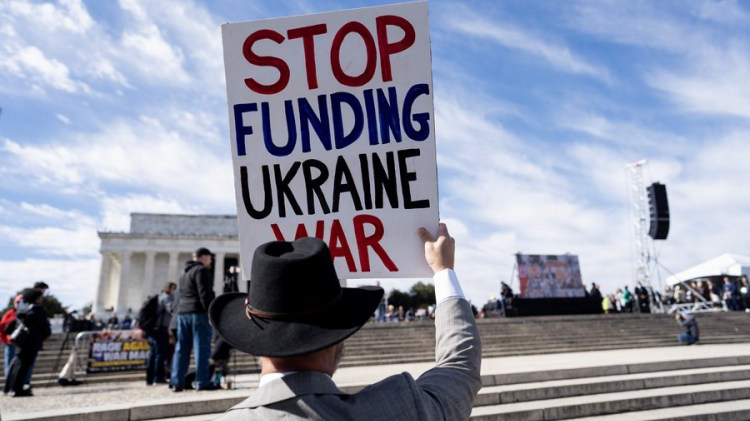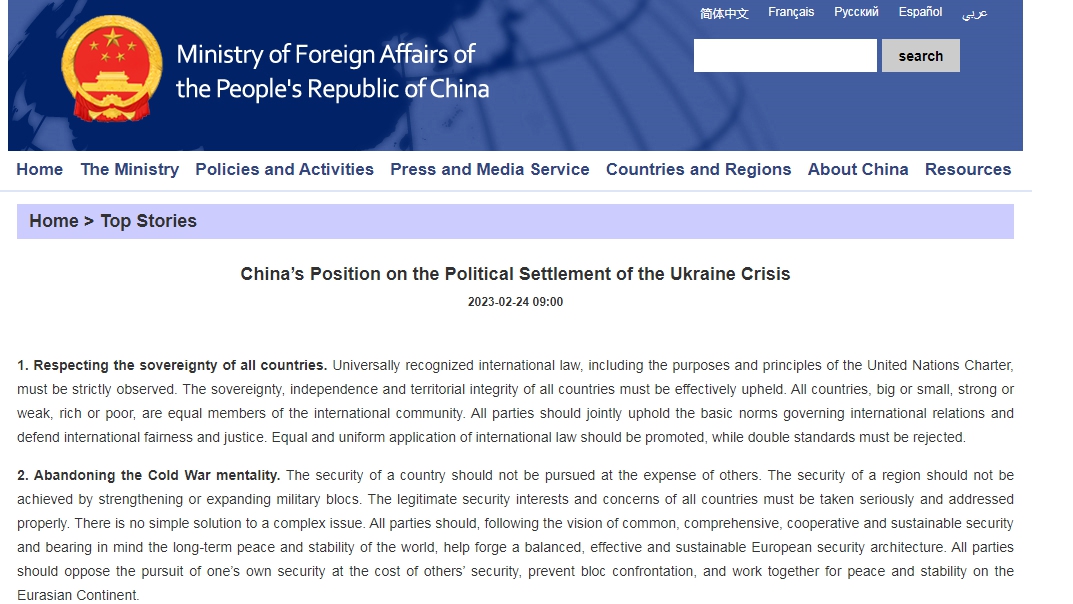
A demonstrator holds a slogan during the anti-war rally in Washington, D.C., the United States, February 19, 2023. /Xinhua
A demonstrator holds a slogan during the anti-war rally in Washington, D.C., the United States, February 19, 2023. /Xinhua
Editor's note: Xin Ge is an associate professor at the School of Public Economics and Administration, Shanghai University of Finance and Economics. The article reflects the author's opinions and not necessarily the views of CGTN.
The Chinese Foreign Ministry unveiled a paper on the political settlement of Ukraine crisis, which has been keenly anticipated by the international community.
The 12-point position document was released on the February 24, anniversary of the launch of Russia's special military operation in Ukraine, with military and civilian deaths and casualties on both sides piling up. As this crisis has transitioned into a protracted one without a clear-cut solution, nothing is more important than brokering a truce and creating favorable conditions for the two belligerents to sit again at the negotiating table.
One year ago, most people did not foresee that the dispute would eventually evolve into the largest military conflict on the European continent since the World War II. And now they realize that a continued conflict between Russia and Ukraine could bring disasters not merely for the two warring parties but also to Europe and the world at large.
The Russia-Ukraine conflict has ruptured Moscow's relations with Western countries and accelerated the transition to a fragmented multipolar world. There have been some attempts. For instance, the Ukrainian side has offered a 10-point peace plan, including the restoration of Ukraine's territorial integrity (to the country's 1991 borders), which Russia has sternly dismissed. Russia and Ukraine did hold several rounds of negotiations and made important progress and the framework for a peace deal had been put on the table.
But as Wang Yi, director of the Office of the Foreign Affairs Commission of the Communist Party of China (CPC) Central Committee, pointed out at the Munich Security Conference on February 18, China is very worried about the possibility of Ukraine crisis extending to a large-scale long-term conflict and has been devoted to the promotion of political solutions through dialogue since the very beginning, but "some people do not want peace talks to succeed or fighting to stop."
Then came the peace proposal by China at the one-year mark of the crisis. While U.S. President Joe Biden made a surprise visit to Kyiv a few days ago to show his unwavering support for Ukraine and promised to send additional military aid to keep the fight lasting, China has taken an objective and impartial stance based on the merits of the issue and has been working on easing the situation and deescalating the crisis.

A screenshot of China's Position on the Political Settlement of the Ukraine Crisis. /China's Foreign Ministry
A screenshot of China's Position on the Political Settlement of the Ukraine Crisis. /China's Foreign Ministry
This paper underscored the need to uphold the principles of sovereignty, independence and territorial integrity of all countries; abandon the Cold War mentality; cease hostilities; resume peace talks; resolve the humanitarian crisis; protect civilians and prisoners of war; keep nuclear power plants safe; reduce strategic risks; facilitate grain exports; stop unilateral sections; keep industrial and supply chains stable; and promote post-conflict reconstruction. These points not only reiterate China's consistent stance and principles on resolving all international conflicts, but also bring forth concrete propositions to assist the peaceful resolution of the Ukraine crisis.
The principles and proposed solutions listed in the paper not only reflect the key planks of China's foreign policy but are also in line with the grand notion of Global Security Initiative (GSI), on which a concept paper was released by Chinese Foreign Minister Qin Gang on February 21. The GSI was first announced by Chinese President Xi Jinping at the Boao Forum for Asia Annual Conference in April 2022. The paper writes that the initiative "advocates a concept of common security, respecting and safeguarding the security of every country," demonstrating China's sense of responsibility for safeguarding world peace and firm resolve to defend global security.
Security is not a prerogative of some countries, but a right for all. The GSI intends to serve the interests of all and protect tranquility for all. The initiative aims to eliminate the root causes of international conflicts, improve global security governance, encourage joint international efforts to bring more stability and certainty to a volatile and changing era. It does not allow the unipolar hegemon to manipulate international law to endorse its "rules-based order," a euphemism for its arbitrary implementation of double standards only in advance of its own interests at others' expenses. As suggested in the paper, "there is no simple solution to a complex issue." More countries should join China in playing a constructive role in maintaining real and lasting security, stability and peace for the whole world.
Chinese President Xi Jinping has accentuated many times that "conflicts and wars produce no winner." A responsible and feasible peace plan at the moment is imperative to help Russia and Ukraine to negotiate for ceasefire, rather than agitate one side to defeat the other.
It is apparently intractable to propose a perfect plan to satisfy all the parties of interests in the Russia-Ukraine conflict. But China is the first major country to promote a ceasefire and peace proposal, which ignites hope for a breakthrough for the current conundrum, and brings genuine peace solutions to this crisis.
(If you want to contribute and have specific expertise, please contact us at opinions@cgtn.com. Follow @thouse_opinions on Twitter to discover the latest commentaries in the CGTN Opinion Section.)